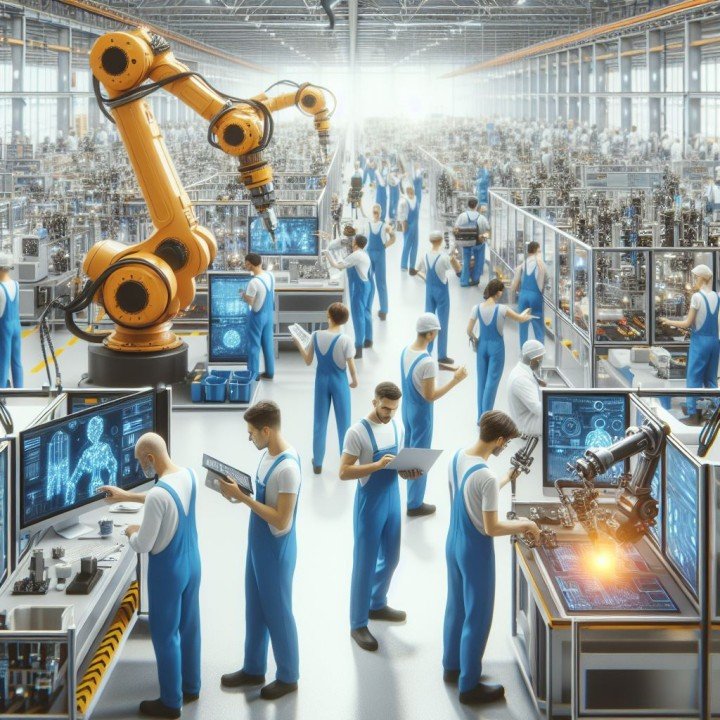n the manufacturing industry, change is the only constant. Traditional methods for producing everything from small screws to large vehicles are becoming outdated as speed, precision, and efficiency become crucial. Today, manufacturers are adopting advanced technologies to transform their processes and outcomes. This blog post explores how the industry is revolutionizing its practices through these innovations, ensuring that manufacturing remains a leader in innovation and efficiency.
A New Era of Manufacturing
The manufacturing industry is experiencing a seismic shift as advanced technologies take center stage. Technologies like the Internet of Things (IoT), Artificial Intelligence (AI), and 3D printing are not just buzzwords—they’re becoming integral components of modern manufacturing. IoT allows machines to communicate with each other in real time, minimizing downtime and optimizing production lines. AI analyzes vast amounts of data to predict maintenance needs and improve product quality. Meanwhile, 3D printing enables rapid prototyping and customized production at a fraction of the traditional costs.
Manufacturers globally are witnessing firsthand the benefits of these technologies. Take, for instance, a car manufacturer using AI algorithms to predict when machinery will require maintenance. This proactive approach reduces unexpected downtime, leading to significant cost savings. Similarly, a furniture company employing 3D printing can create bespoke designs rapidly, meeting the personalized demands of its clients efficiently. These real-world examples highlight the paradigm shift toward a more connected and intelligent manufacturing ecosystem.
The Benefits of Technology in Manufacturing
The adoption of advanced technologies in manufacturing comes with numerous benefits. Manufacturers can expect substantial cost savings by automating repetitive tasks and reducing human error. For instance, laser cladding, a technique used to apply materials onto surfaces, becomes more precise and efficient, resulting in less waste and higher-quality products.
Improved quality is another significant advantage. With real-time data analysis, manufacturers can identify defects in the production process before they become a problem, ensuring that only the best products reach consumers. Furthermore, these technologies enable faster time-to-market. By streamlining processes and enhancing communication between different manufacturing stages, products can be developed and delivered at lightning speed, giving companies a competitive edge.
These benefits are not just theoretical; they’re being realized by forward-thinking companies worldwide. By leveraging advanced technologies, businesses are not only improving their bottom line but also transforming the way we think about manufacturing.
Overcoming Challenges in Technology Adoption
Despite its numerous advantages, adopting advanced technologies in manufacturing is not without challenges. One of the primary hurdles is the initial cost of implementation. Technologies such as IoT sensors, AI software, and 3D printers require a significant upfront investment, which can be daunting for smaller manufacturers.
Employee training is another concern. Employees accustomed to traditional manufacturing methods may find it challenging to adapt to new technologies. This shift requires comprehensive training programs to ensure that staff can fully leverage the capabilities of these advanced tools.
To overcome these challenges, manufacturers must adopt a phased approach. Start with pilot projects to demonstrate the value of the technology and slowly scale up as confidence grows. Additionally, investing in employee training programs ensures that staff are equipped with the necessary skills to use these technologies effectively. Collaborations with technology providers can also offer ongoing support and updates, further easing the transition.
Predicting the Future of Manufacturing
The future of manufacturing looks promising, with continuous advancements in technology. Emerging trends, such as augmented reality (AR) and blockchain, are poised to further revolutionize the industry. AR can enhance training by providing immersive experiences, while blockchain can ensure transparent and secure supply chains.
In the long term, the integration of these advanced technologies will have a profound impact on global manufacturing. Factories will become more autonomous, relying on AI and IoT to self-regulate and optimize production. This shift will lead to a more sustainable manufacturing process, reducing waste and energy consumption.
The role of humans in manufacturing will also evolve. While machines will handle repetitive and labor-intensive tasks, humans will focus on creative and strategic roles, driving innovation and growth. This collaboration between humans and machines will define the future of manufacturing, unlocking unprecedented levels of efficiency and productivity.
Conclusion
Now that you’ve grasped the influence of advanced technologies on manufacturing, it’s time to fully embrace this digital revolution. The benefits are undeniable—enhanced efficiency, significant cost savings, and a competitive advantage. As more companies adopt these innovations, those reluctant to do so risk being left behind.




